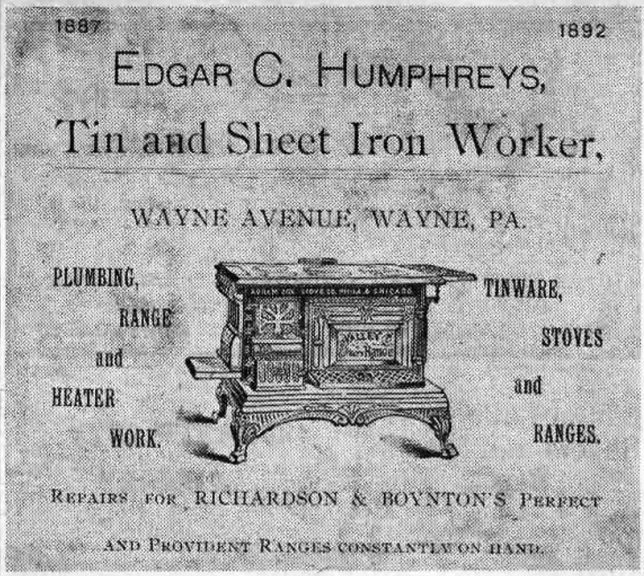 In last week’s issue, your columnist described some of the advertisements which appeared in the cook book put out in 1892, by the Ladies’ Aid Society of The Wayne Methodist Church. The picture in this week’s column shows the stove on which the lady of the house could try out the delectable recipes. It could be purchased right on Wayne avenue, at Edgar E. Humphreys, Tin and Sheet Iron Worker. Such a stove, as illustrated in this article, was called the “Valley Novelty Range.” It could be kept “brilliant and black” with “Solar Paste” for which the housewife was “to ask her grocer and take no other.”
In last week’s issue, your columnist described some of the advertisements which appeared in the cook book put out in 1892, by the Ladies’ Aid Society of The Wayne Methodist Church. The picture in this week’s column shows the stove on which the lady of the house could try out the delectable recipes. It could be purchased right on Wayne avenue, at Edgar E. Humphreys, Tin and Sheet Iron Worker. Such a stove, as illustrated in this article, was called the “Valley Novelty Range.” It could be kept “brilliant and black” with “Solar Paste” for which the housewife was “to ask her grocer and take no other.”
L.K. Burket and Brothers, now operating more than 60 years later under the same firm name, could sell the housewife “the best Lehigh and Susquehanna Coal at the lowest market rates” as well as “the best Virginia pine kindling wood, two or three sticks of which will be of service in getting up a quick fire, at a trifling cost, for an early breakfast or hurried meal.” C.B. Walton and Company, with offices in both Wayne and Devon, would also sell coal, as well as lumber and feed.
In Wayne, T.T. Worrall and Sons, whose specialization was “fine teas, coffees and spice” would supply the housewife with “fancy and staple groceries.” From Philadelphia, Showell and Fryer sent a salesman every Saturday to solicit orders for their “fine groceries,” which would be delivered by wagon the following Monday. E. Bradford Clarke, “family grocers,” located at Chestnut and 15th streets, had “free deliveries by wagon every Thursday of the year, at all points on the line of the railroad from Philadelphia to Devon.” Woodman, Gillette and Company, Grocers, at 13th and Market streets, advertised that “every barrel of our Red Seal Flour is guaranteed to make 300 pounds of bread.” (At that time there was no “bread man” making his daily rounds.)
Among the small dealers in meat and groceries in Wayne, was C. Pugh, with his store at the corner or West Wayne avenue and Conestoga road. Apparently, the only milkman to advertise in the Methodist Church cook book was Joseph H. Childs, of Wayne, by whom milk was served daily. (This was still in the period when the milk man poured milk from his own big pail into the smaller one placed at the back door by the housewife.)
Two advertisers, whose work was as vital 60 years ago as it is outdated now, were William P. Sassaman, harness and harness supplies, and Joseph K. Lentz, proprietor of the Wayne Wagon Works. The former was “manufacturer of Fine Harness and Harness Supplies” located on Lancaster avenue, while the latter always had “new carts and wagons on hand” and “attended to all kinds of jobbing in his line at the shortest notice.” Their places have been taken long since by the automobile dealer and the automobile repair man.
In the 1890’s the Wayne Title and Trust Company was in a small and picturesque building, on the same site on which the present modern building now stands. It is now known as the Wayne office of the First Pennsylvania Banking and Trust Company.
J. M. Fronefield, Jr.’s Wayne Pharmacy was just across the street, on the corner now occupied by the Sun Ray Drug store. Its proprietor was a graduate of the Philadelphia College of Pharmacy who advertised his “stock of medicines as equalled by but few city stores.” But to one small girl of the 1890’s, now one of Wayne’s “old timers,” the store is still remembered for its soda fountain, where delicious ice cream sodas were dispersed for ten cents.
